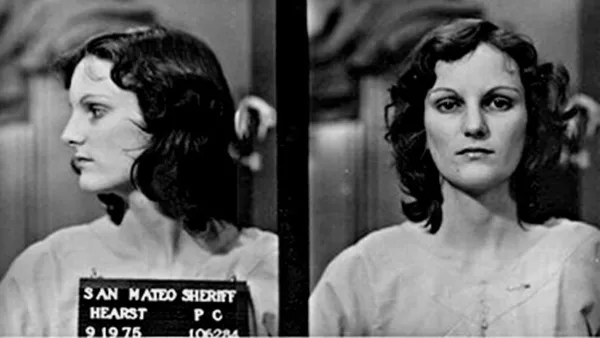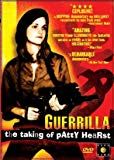Eye For Film >> Movies >> Guerrilla: The Taking Of Patty Hearst (2004) Film Review

"We were running rampant around the world and then lying about it, "Russ Little says. "The country was out of control; the country was being run by criminals."
Surprisingly, he is not talking about George Dubya and The Neo-Cons. He's talking about 1974, the Nixon administration and the Vietnam war. "We felt there was no future."

Little was a student at Berkeley, California, who felt helpless against what he saw as bad decisions made by bad men. The Symbionese Liberation Army was born out of this frustration. Ostensively an anti-war movement, with strong socialist leanings and a tendency to issue pompous dictats about feeding the hungry and "every black man in prison is a political prisoner," the self-styled urban guerilla group started out talking to itself with less members than a suburban Tupperware party.
Robert Stone's film has uncovered fresh footage, mainly of media hacks staking out the Hearst family home after Patty was snatched, and persuaded Little, who was sent down for life for murdering a black schoolteacher - no one explains why - and Mike Bortin, founder members of the SLA, to speak about it for the first time. They appear articulate, rational and intelligent.
The film leaves many questions unanswered, including, why did a faction within the group decide to rob banks and kill people? Kidnapping the daughter of one of the richest men in America is never satisfactorily explained. Did they want ransom? They asked that the poor should be fed. Was it an act of revenge against the fascist ruling pigs? Patty's dad owned newspapers, not oil wells. Why did she convert to the cause while in captivity, change her name to Tania and take up a kalashnikov? After being pardoned by President Carter, having served a year and a half in jail, why did she embrace the family again and renounce her former lover, Cujo, the SLA leader.
Although fascinating as a record of a rebellious period of American history, when revolution was on the lips of long-haired protesters and the National Guard gunned down students at Kent State University and riots in black ghettos resembled the opening salvos of a race war, the SLA story feels like a postscript to an anarchic period of people power, in which a deeply entrenched reactionary element amongst those in authority was let loose, like the hounds of hell, upon the peace marchers and black separatists.
There are resonances of Guantanamo Bay, Abu Ghraib and the seige at Waco, but, at the heart of it, there is no substitute for Patty. She remains, even after Stone's exhaustive investigations, an enigma. Who is she? Interviewed on her release at the prison gates, she resembles nothing so much as a Stepford wife.
Reviewed on: 26 Aug 2004


















